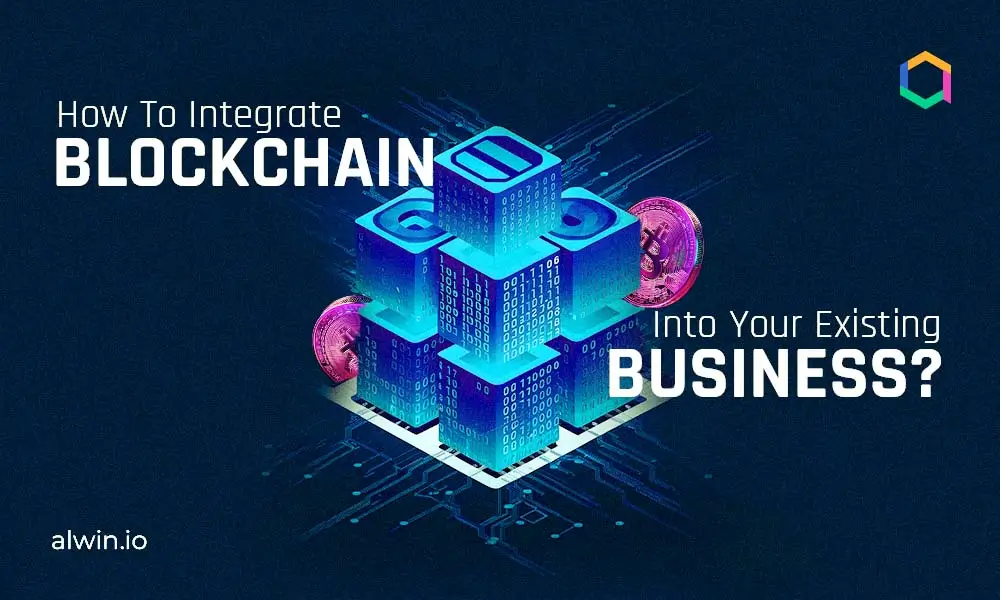Are you looking for innovative ways to improve your business? Many companies are working hard to increase their platform's productivity.
Efficiency, high-level security, and transparency are the core elements of successful top-rated companies. One technology that has the potential to transform business operations is blockchain. Originally known for powering cryptocurrencies like Bitcoin, blockchain has evolved into a powerful tool that can be integrated into various business sectors, from finance and supply chain management to healthcare and data security.
But how can you utilize this technology in your existing business infrastructure? The process of integrating blockchain can seem complex, but with the right approach, it can deliver significant benefits for your business. From automating transactions with smart contracts to providing a secure, decentralized way of managing data, blockchain can streamline operations, reduce fraud, and create new business opportunities.
Why Blockchain Matters for Businesses?
Blockchain technology is quickly emerging as a key component for companies looking to innovate and optimize their processes. Beyond its original association with cryptocurrency, blockchain's decentralized structure offers organizations a level of transparency and trust. Businesses in industries like supply chain management, for example, can use blockchain technology to produce an unchangeable record of every product's journey, giving consumers up-to-date information on the origin and legitimacy of products.
This visibility helps combat fraud and builds customer loyalty through trust. Additionally, blockchain’s smart contracts automate transactions, cutting time and costs in industries like real estate and finance. As businesses embrace data-driven approaches, blockchain provides data integrity by securely storing information, making it vital for sectors like healthcare and legal services. By adopting blockchain, companies can future-proof themselves, stay ahead of technological changes, and attain new opportunities for innovation and growth.
Factors to Consider Before Implementing Blockchain
Integrating blockchain technology can transform your business operations, but it demands thoughtful planning and assessment. Before moving forward, keep these crucial factors in mind to pave the way for a successful implementation:
1. Define Objectives and Use Cases
Identify the problems you want to solve with blockchain, such as improving transparency, improving security, or reducing costs. Focus on specific use cases like supply chain tracking, smart contracts, or secure payments to secure effective implementation.
2. Assess Blockchain’s Suitability for Your Business
Determine if blockchain is the right fit for your needs. Consider whether your processes require decentralization, greater transparency, or tamper-proof records. If a centralized system meets your requirements, blockchain may not be the best option.
3. Choose the Right Blockchain Type
Select the blockchain model that fits your requirements:
Public Blockchain: Ideal for open, decentralized networks like cryptocurrency systems.
Private Blockchain: Suitable for businesses prioritizing privacy and controlled access.
Consortium Blockchain: Perfect for industries like banking and trade finance, where multiple organizations collaborate.
4. Integration with Existing Systems
Make sure blockchain can be easily integrated with your current infrastructure, such as ERP, CRM, or supply chain management systems. Evaluate interoperability with existing technologies to avoid disruptions and ensure a smooth transition.
5. Regulatory and Compliance Requirements
Blockchain projects must comply with data privacy laws and industry-specific regulations such as GDPR or HIPAA. Confirm that smart contracts and blockchain records align with legal requirements in your jurisdiction.
6. Cost and Resource Allocation
Evaluate the overall expenses of implementing blockchain, considering development, infrastructure, training, and maintenance costs, as well as energy consumption for platforms such as proof-of-work blockchains and the resources needed for continuous support.
Steps to Integrate Blockchain into Existing Business
Integrating blockchain goes beyond simply integrating a new technology; it’s about reevaluating your processes to improve efficiency and drive innovation. Here are some practical steps to integrate blockchain for meaningful change in your business:
1. Identify Key Business Areas for Blockchain Implementation
Analyze your operations to identify where blockchain can make the most impact. Look for inefficiencies, security gaps, or trust issues that blockchain can address. High-value use cases may include supply chain management, identity verification, or payment systems. Prioritizing these areas will provide visible results and early success for your business.
2. Develop a Custom Blockchain Strategy
Create a strategy that aligns blockchain capabilities with your long-term business goals. Consider how blockchain will fit into industry trends and your competitive landscape. A well-designed strategy will drive measurable value and should be reviewed regularly to adapt to market changes and technological advancements.
3. Collaborate with Stakeholders
Engage key stakeholders, including team members, clients, and partners, to align expectations and discover collaboration opportunities. Gaining buy-in from all parties is essential for smooth adoption and operational alignment. Maintain open communication to provide the blockchain solution that effectively addresses their needs and concerns.
4. Select the Right Blockchain Tools and Technologies
Choose blockchain tools and platforms that best meet your business needs. Evaluate options like Ethereum, Hyperledger, or Solana based on scalability, security, and deployment ease. Make sure your selected platform supports your industry’s unique requirements and consider both on-chain and off-chain solutions to cover all business needs.
5. Build or Partner with a Blockchain Development Team
Assemble a team within the company or team up with a Smart Contract Development Company to guarantee an effective implementation. Seek developers who are knowledgeable about smart contracts, blockchain architecture, and security. By collaborating with a specialized business, you can get useful insights and best practices. Long-term advantages and more control over your blockchain ecosystem will result from developing your internal knowledge.
6. Map Out a Pilot Program
Initiate a pilot program to assess blockchain’s real-world impact on your business. Select a specific process or department, and measure outcomes such as efficiency gains, cost reductions, and improved transparency. The pilot will offer insights for refining your approach and help address unexpected challenges before the full-scale escalation.
7. Adapt Internal Processes and Policies
Revise workflows, protocols, and policies to align with the blockchain system. Equip your team to be trained in blockchain fundamentals and understand how the technology will impact daily operations. Update internal policies regarding data management and privacy to reflect the decentralized nature of blockchain.
8. Implement Gradual Integration
Roll out blockchain in phases, starting with non-critical areas to minimize risk. Once the system proves successful, expand its application to more complex or mission-critical processes. A gradual approach reduces disruptions and allows your team to adapt more effectively.
9. Monitor Performance and ROI
Track blockchain’s impact on key metrics such as transaction speed, security, and cost savings. Regular monitoring helps identify optimization areas and improves alignment with business objectives. Measure ROI not only in financial terms but also in operational efficiencies and customer satisfaction.
10. Innovate with Blockchain-Driven Opportunities
Use blockchain to explore new revenue streams or operational models. Consider innovations like Asset Tokenization, decentralized applications (dApps), or blockchain-based customer loyalty programs. Embracing these opportunities can set your business apart and open new market potential.
Tools and Languages for Blockchain Development
To create distributed ledgers, smart contracts, and decentralized apps (dApps), blockchain development requires certain tools and programming languages. The most popular tools and languages for blockchain development are broken down as follows:
Ethereum: A leading platform for decentralized applications (dApps) and smart contracts. Uses Solidity and Vyper for contract development.
Hyperledger Fabric: A blockchain framework with permissions intended for business use. Supports Java, JavaScript, and Go for creating applications.
Solana: A high-performance blockchain focused on scalability and speed. Utilizes Rust and C for smart contract programming.
Binance Smart Chain (BSC): A fast, cost-effective blockchain compatible with Ethereum. Supports Solidity and Vyper for smart contracts.
R3 Corda: A distributed ledger platform customized for finance and insurance sectors. Uses Kotlin and Java for building CorDapps.
Truffle Suite: A comprehensive development framework for Ethereum smart contracts. Includes tools like Truffle and Ganache for efficient testing and deployment.
Remix IDE: A web-based IDE for developing and deploying Ethereum smart contracts. Offers real-time feedback and Solidity compilation.
Chainlink: A decentralized oracle network that links data from the actual world to smart contracts. includes VRF and Chainlink Nodes for safe data integration.
EOSIO: A scalable platform for high-performance dApps with a user-friendly focus. Developed using C++ and the EOSIO SDK.
Parity Substrate: A customizable framework for creating personalized blockchains. Built with Rust and integrated with Polkadot for interoperability.
Benefits of Integrating Blockchain into Your Business
As organizations seek innovative solutions to modern challenges, blockchain stands out as a powerful tool for simplifying processes and building trust.
Blockchain Matters for Security
Blockchain technology offers a strong defense against cyber threats. Its decentralized and encrypted nature makes it extremely hard for hackers to alter data, which helps prevent fraud and improves overall security.
The Power of Transparency
With blockchain, every transaction is recorded in real time and cannot be changed. Stakeholders can have a clear view of processes through transparency that builds trust and accountability in the system.
Cutting Costs with Blockchain
By eliminating intermediaries and automating processes like payments and contracts, blockchain significantly reduces operational expenses. This smoothened approach not only saves money but also increases efficiency across the board.
Simplifying Supply Chains
Blockchain transforms supply chain management by making it easier to track and verify goods. This improves efficiency, reduces delays, and combats fraudulent activities. Overall, the assurance of the products is genuinely handled.
Speeding Up Transactions
Rapid transactions are essential for most companies as they have more business deals and projects. Blockchain removes the delays associated with traditional banking. It allows for fast, direct peer-to-peer transactions, even across borders, making financial exchanges quicker and more efficient.
Automating Agreements with Smart Contracts
Agreements are way better handled with smart contracts as they automatically carry out transactions when specific conditions are met. It reduces paperwork and reducing human errors.
Exploring New Business Horizons
Blockchain paves the way for innovative business models, including tokenized assets and decentralized finance (DeFi). These innovations open new revenue streams and improve solutions for digital identity that offer businesses fresh avenues for growth and engagement.
Final Thoughts
Integrating blockchain into your business through specialized Blockchain Development Services from WeAlwin Technologies is a transformative step that can drive innovation, efficiency, and trust across your operations. However, successful implementation requires careful planning, the right tools, and a strategic approach customized to your specific goals. While blockchain offers immense potential, its true value lies in addressing real-world challenges and delivering measurable outcomes. By adopting blockchain thoughtfully, businesses can utilize our expertise to stay ahead in an increasingly digital and decentralized world.



